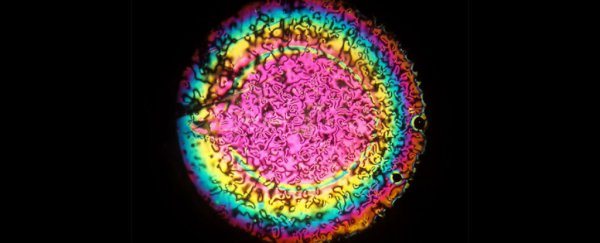Instead of having spectacles perched awkwardly on your nose, or itchy contacts that you can't stop losing, what if the same optical technology could be implanted inside the eyeball - a permanent set of contact lenses to correct your sight? That's the aim of a new invention by UK student Devesh Mistry, which uses an auto-focusing liquid crystal material to correct defects in vision.
Mistry's work is aimed at helping elderly people with failing eyesight, and in particular, those suffering from presbyopia: the condition is usually found in the over-45s and causes the natural lens inside a person's eyeballs to become stiff and inflexible. That rigidity means that the eye muscles can't work properly to bring long-range objects into focus.
Lenses made with liquid crystals - the same material found in modern-day television sets and computer monitors - can focus and adjust themselves automatically in response to prompts from the eye muscles, and that means a damaged eye could be effectively repaired. The implant operation would work along similar lines to the one already used to remove and replace cataracts, Mistry says.
"Liquid crystals are a very under-rated phase of matter," he explained to The Times. "Everybody's happy with solids, liquids and gases and the phases of matter, but liquid crystals lie between crystalline solids and liquids. They have an ordered structure like a crystal, but they can also flow like a liquid and respond to stimuli."
And it's those qualities that make the new research so promising, even if there's some way to go yet before such an operation is going to be possible: Mistry is hoping to have a prototype lens ready by the time he completes his doctorate at the University of Leeds in 2018.
If that happens, the procedure to implant the lens could be ready to go by 2025: it would most likely be quick, simple, and carried out under local anaesthetic. The surgeon would need to make a small incision inside the cornea and then use ultrasound to break down the old lens. At that point, the synthetic replacement could be inserted and restore normal vision to the patient.
Presbyopia cured with help of a bionic eye lens: that's the goal.
Mistry is working on the project in partnership a specialist contact lens manufacturer called UltraVision CLPL, which is run by two University of Leeds alumni whose research helped lay the foundations for the new LCD prototype. Mistry has also been awarded an Industrial Fellowship from the Royal Commission for the Exhibition of 1851 as he looks to perfect the technology and bring it to market.
In the meantime, here's a little trick from MinutePhysics if you really just don't feel like wearing your glasses today:

